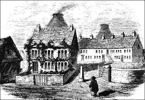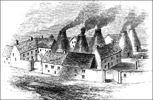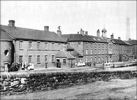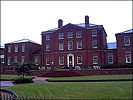What
was happening in the Potteries between 1740 and 1790
1738 - John
Wesley makes his first preaching trip to Newcastle-under-Lyme.
1740 -
By this date Thomas Whieldon had opened
a small pottery in Fenton Low. Josiah Spode I was one of his
apprentices.
1740 - Methodist
society formed at Burslem.
1748 -
The burial of the so-called 'Burslem
Witch' Margaret Leigh (Peggy Lee).
1749 -
Josiah Spode I was apprenticed to Thomas
Whieldon, for whom he worked until at least 1754.
1754 -
Josiah Spode I married Ellen Finley who
had a haberdashery business. They had seven children including Josiah
Spode II.
Thomas Whieldon was in partnership
with Josiah Wedgwood I from 1754 to 1759. Thomas Whieldon's products
included salt glazed wares, agateware and a cream coloured
earthenware which was later perfected as Queens Ware by Wedgwood.
1755 -
Josiah Spode II born.
1759 -
Josiah Wedgwood I rented the Ivy House
Pottery Works, Burslem, from his uncles John and Thomas Wedgwood.

The Ivy House
Works
1760 -
Josiah Spode I began a pottery business
on his own account about this date. He rented a works at Shelton and
later, in partnership with William Tomlinson he rented the Barks and
Turner pottery at Lane End.
1760 - John
Wesley makes his first preaching trip to Burslem.
1761 - Burslem's first Town
Hall Built.

Burslem's 1st
town hall
1763 -
The potters petitioned Parliament to
build turnpike roads. The corporation of Newcastle-under-Lyme opposed
this move since it would mean a loss of revue to the town - they had
their own toll gates. A House of Commons Committee called for evidence
from the petitioners and in 1763 Wedgwood told them that the roads
were "in very bad condition, narrow in some parts, and in the Winter
Season impassable in many places". Parliament granted their Bill and
turnpikes were constructed.
1764 -
Josiah Wedgwood I transferred his
rapidly expanding business from Ivy House Works to the Brick House
Works (also known as the Bell Works) in Church Street, Burslem. About
this time he perfected the cream coloured earthenware which brought
him the patronage of Queen Charlotte, wife of George III, it became
known as Queens Ware.
Wedgwood met Thomas Bentley, a Liverpool merchant, who was to become
his closest friend, confidant and later partner.

Brick House
Works
1765 -
Josiah Wedgwood
records: "On Friday last I dined with Mr. Brindley, the Duke of
Bridgewater's engineer, after which we had a
meeting at the Leopard on the subject of
a Navigation from Hull.... to Burslem"
1766 -
Josiah Wedgwood I purchased the
Ridgehouse Estate and built a new factory there (opened on 13 June
1769). This factory was the nucleus of an industrial village which he
called Etruria.
1769 -
Josiah Wedgwood I opened his factory in
Etruria (on the side of what was to be the Trent and Mersey Canal).

Etruria Works
Josiah Wedgwood II was born, the
second son of Josiah Wedgwood I and Sarah nee Wedgwood. He
eventually succeeded his father as head of the business. The elder
son, John, had left the industry for banking and horticulture.
Work started on the Trent and
Mersey Canal (completed in 1777).
1770 -
Josiah Wedgwood I completes the building
of Etruria Hall.

Etruria Hall
1773 -
Josiah Wedgwood I commissioned by the
Empress Catherine II of Russia to make a 1000 piece dinner service.
1775 -
Josiah Spode II traded in London as a
dealer in earthenware, glass and porcelain. In this year he married
Elizabeth Barker and had two sons (including Josiah Spode III) and
three daughters.
1776 -
Josiah Spode I purchase the Barks and
Turner factory in Lane End (he had been renting it from 1760) with a
mortgage of £1000.
1777 -
The Trent and Mersey Canal completed.
The engineer responsible was James Brindley, who died before the canal
was completed.
'1784, March 31st
- I reached Burslem, where we had the first society in the county,
and it is still the largest, and the most earnest'.

John Wesley:
Staffordshire ceramic bust
In 1784, Wesley sat for Enoch Wood (1759-1840)
who crafted the model for this bust of Staffordshire pottery.
The artist claimed that Wesley had thought this likeness
"much the best" that anyone had attempted.
1789 -
Josiah Wedgwood I produced a replica of
the Portland vase.
Longton's Times Square laid out.
'1790, Monday, March 29th
- At nine I preached in the new chapel at Tunstall, the most elegant I
have seen since I left Bath. The people seemed to devour the word."
John Wesley died in March 1791
|
![]()
![]()
![]()
![]()
![]()
![]()